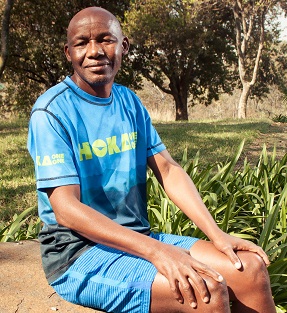Thulani Sibisi
Winner of the 1986 Two Oceans Marathon and a Prostate Cancer Survivor

Thulani’s story is one of a constant struggle to win, despite the odds. He grew up in poverty in rural KZN near to Newcastle. Initially he could only attend school for the first 6 months of every year as he was required to assist on the farm where his parents worked for the remainder of the year. In an effort to assist him with his education they moved and built a house in Blaauwbosch so that he could attend school. But life was still hard as he would have to rise every morning at 4am for the 9km walk to the local school. Like many of his generation he left school before he had matriculated to seek work in the city.
As luck would have it he got a job as a gardener with Johan Rupert, eldest son of South African business tycoon Anton Rupert. Whist working for Johan he saw a marathon on TV and proclaimed that he could run faster than the athletes competing in the race being broadcast. Johan decided to see if the young man’s boasting was for real and assisted him to enter his first race, the Soweto half marathon. He placed 5th and his running career began. He was assisted along the way by a number of famous sporting celebrities, from Springbok rugby player Morné Du Plessis, who organised him his first pair of running shoes, to Johnny Halberstadt, who organised him his first full set of kit, to Bob De La Motte who became a trusted friend.
In 1983 he left Johan Rupert’s employ to join the Frontrunner shop in Sandton and pursue his passion. He was given time off in the mornings and afternoon to run and he began to make rapid progress under the coaching of Tony Frost. But there were still obstacles. These were the days of Apartheid and freedom of movement was against the law. Running alone without a ‘dompas’ could land you in jail, but thankfully there were men who were willing to help. David Flood, the owner of Deans clothing store in Sandton, would often accompany Thulani on his bicycle. Nothing could hold Thulani back, he was hungry for victory.
The training paid off and he soon began placing amongst the top athletes of the day. Placing 2nd place in The Peninsula and Stock Exchange Marathons in 1985 earned him a place as one of the serious marathon runners of the day. But it was the Two Oceans title that he really wanted. In 1983 he had been dropped after 43 km’s by the formidable Bruce Fordyce and he had sworn that the next time he entered the race he would win it. But he knew that guts alone was not enough, so he took his time and learned the strategy required to compete against the elite runners of the day. By 1986 he was ready. His only obstacle was to find the money for a plane ticket and accommodation in Cape Town. He went back to his old boss Johan Rupert, who booked him a plane ticket and accommodation. He jokingly told Thulani that if he didn’t win he would expect a full refund. He stepped onto the plane and couldn’t believe it when he was ushered into business class. He couldn’t believe that only 5 months before he had been sitting in the back of a police vehicle, arrested for not having a ‘dompas’. He won the race and sent Johan a video of his performance to thank him. He had earned his place as one of the top athletes in the country.
In 1987 he finished 2nd behind Thompson Magawana, who is still the record holder. Unfortunately he had also reached the end of his career as a runner due to continuous problems with stress fractures. But his greatest challenge still lay ahead.
In 2012 he began experiencing urinary and bowel problems. His condition worsened and it was when he collapsed on the way to work one day that he realised that something was seriously wrong. The timing could not have been worse, it was just before Christmas and although the doctor had already picked up that there was a prostate problem with the digital rectal examination, he would have to wait until after Christmas for the PSA results. But cancer cells don’t take holidays and Thulani’s body had had enough. On Christmas day his prostate cancer caused a blockage of the urethra (the tube that transports urine from the bladder out of the body via the penis). He thought that drinking lots of water would help to clear the blockage. This only served to make things worse as it caused his bladder to distend. Unable to urinate he was taken to hospital and catheterised. The PSA tests confirmed a strong suspicion for prostate cancer and he was placed on the waiting list for a biopsy. The results of the biopsy confirmed the diagnosis of prostate cancer and treatment was initiated.
I asked Thulani what he found the hardest about his ordeal. His answer encapsulates the typical male sense of denial when it comes to serious health issues, “my biggest challenge was to accept that I had prostate cancer.”
With the acceptance came the realisation that something more needs be done to create awareness about prostate cancer. Today Thulani uses every platform available to him to talk about his experience and to encourage men to be more responsible about their health. He is one of the founding members of the Soweto marathon and he hopes that this event can be used to educate men within the community about prostate cancer. He believes that men need to support each other more. His own life bears testimony to this. He has weekly contact with two of his old running comrades, Johnny Halberstadt and Bob De La motte, despite the fact that both live thousands of kilometres away.
He believes that his life has been spared for a reason and his purpose now is to help men to be open about prostate cancer. He has the tenacity and motivation to make a difference in the lives of South African men. His victory now will be to save lives by motivating men to go for screening and to give support to those who have been diagnosed with cancer.
By Andrew Oberholzer CEO of The Prostate Cancer Foundation.
From an interview conducted in September 2015 with Thulani.





